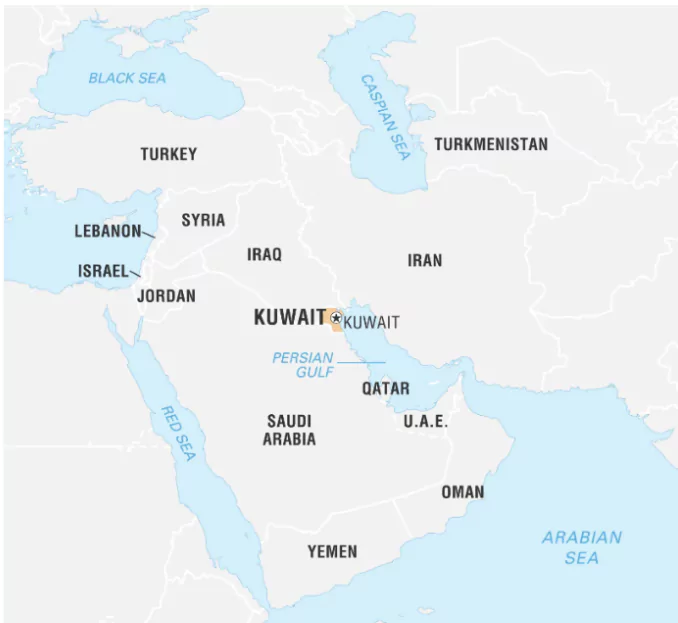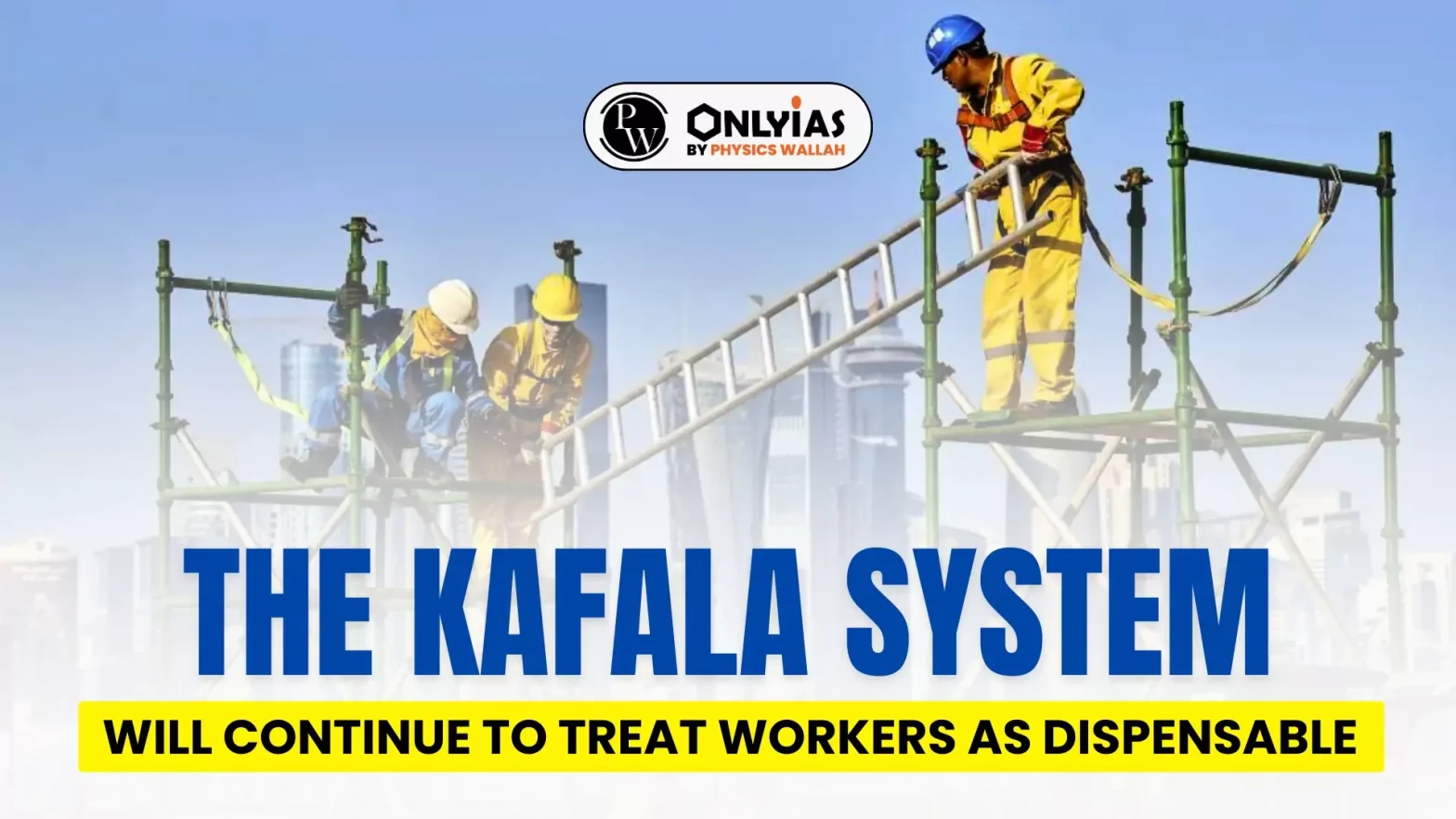Within hours of the fatal fire that killed 49 migrant workers a majority of whom are Indians – in Mangaf area of Al Ahmadi municipality, Kuwait, several actions were taken immediately.
| Relevancy for Prelims: About Kafala System, Kuwait Tragedy Underscores Need For New Emigration Law, Kuwait Map, Gulf Cooperation Council (GCC), GCC states (Saudi, UAE, Qatar, Bahrain and Oman), etc.
Relevancy for Mains: Kafala system exploiting migrant workers, Key features of the Kafala system, Reforms needed to ensure the protection of migrant workers’ rights in the region etc. |
Kafala System
Kuwait’s Interior Minister said the fatalities were due to the greed of the employer and building owner – in this instance, both parties being the same, NBTC. He announced the company officials would be held criminally liable; and officials of the municipality were suspended by the Ministry of Works and Minister of State for Municipal Affairs for their failure to maintain building codes.
Enroll now for UPSC Online Course
- In the coming days, more announcements will be made and a few heads will roll, the families of the deceased will receive some compensation and the injured will receive a smaller amount.
- The names of the 49 dead are unlikely to be shared officially by Kuwait but will appear in the media in India and the Philippines.
- It is easy to replace a number, recruit anew and bring in more workers to fill the gap left behind by those who perished.
- To humanise them would mean to acknowledge their presence as more than just labour and entail safeguarding all of the rights of the migrant population, and that would only be possible by dismantling the all- pervasive Kafala system a complex of laws and practices that ensure state and citizens hold all the power, while individual migrants are treated as temporary even if the dependency on their labour is near- permanent.
- This is why any announcement by Kuwait promising action must be scrutinised minutely.
 Kuwait (foreigners comprise 70% of its 4.3 million) and the rest of the GCC states (Saudi, UAE, Qatar, Bahrain and Oman), in essence, follow the same practice with varying degrees of control over migration and migrants.
Kuwait (foreigners comprise 70% of its 4.3 million) and the rest of the GCC states (Saudi, UAE, Qatar, Bahrain and Oman), in essence, follow the same practice with varying degrees of control over migration and migrants.- These six states are home to roughly 35 million migrant workers, accounting for 10% of all international migrants, and Indians constitute the single largest group amongst them.
- Let us look at the immediate concern – crowded, unsafe and unhygienic labour accommodation that makes its residents most vulnerable to any exigencies that may arise in a country.
- No lessons were learned then, and tragedies recur in different forms.
- Just a few years ago, when the world came to a standstill due to the COVID-19 pandemic, GCC states struggled to contain the spread of the virus in these labour accommodations.
- They contained the migrants instead of the virus, trapping them in crowded spaces and not allowing them to access services easily.
- Kuwait had some of the most discriminatory lockdown practices, particularly in areas densely populated by migrant workers such as Jleeb, Mahboula, and Hasawiya and announced an amnesty, deporting tens of thousands of workers at the height of the pandemic in April 2020.
- Kuwait does have some kind of code on standards for workers’ accommodation but its focus has been more on evicting ‘bachelors’ from family zones and moving them to subpar living spaces than to actually ensure employers provide suitable accommodation.
- As per Kuwait’s labour law, employers engaged in government contracts (such as NBTC) must provide suitable housing or an allowance – 25% of wages if they earn the minimum wage (KD75) or 15% if paid above the minimum wage.
- The cost of decent living is roughly KD200 per person, not including rent. The extremely low value placed on their labour determines their place in the economic hierarchy.
- This huge discrepancy between the cost of living and minimum wage (where it does exist across the GCC) is one of the critical control factors of the Kafala system.
- Work and residence visas are tied to the employer, ensuring they have a stranglehold over their employees’ lives.
- For the nearly three million migrants in Kuwait’s low- income belt, this means absolute dependency on the employer for accommodation, food and transportation, which just as easily can be withheld or withdrawn.
- The minimum salary requirement to sponsor a family in Kuwait is KD800, so the majority of migrants are unable to bring their families and migrate alone.
- But GCC states do not take kindly to any form of labour organising or unionisation.
- To allow workers to have a voice is to allow them to challenge the status quo. The easiest way to prevent this is to keep wages low enough that the workers are in a constant state of financial insecurity, and then to deport them with ease at the first sign of protest or discontent.
- In the heat of the aftermath, Kuwaiti officials will make promises of better safety standards and more stringent penalties but will depend on policing of employers and workers to implement this, and shy away from systemic changes that would best enforce the law.
- That would be to empower workers, the ‘beneficiary’ of these reforms, to raise their voices against the injustices they may face.
- Domestic Workers, who constitute 27% of the entire labour force in Kuwait, are excluded from the labour law, and are amongst the most marginalised of the migrant population.
Check Out UPSC CSE Books From PW Store
Conclusion
Kuwait’s promises for reform must be scrutinized as systemic changes, not temporary measures, are needed to truly protect and empower migrant workers.
![]() 17 Jun 2024
17 Jun 2024

 Kuwait (foreigners comprise 70% of its 4.3 million) and the rest of the GCC states (Saudi, UAE, Qatar, Bahrain and Oman), in essence, follow the same practice with varying degrees of control over migration and migrants.
Kuwait (foreigners comprise 70% of its 4.3 million) and the rest of the GCC states (Saudi, UAE, Qatar, Bahrain and Oman), in essence, follow the same practice with varying degrees of control over migration and migrants.